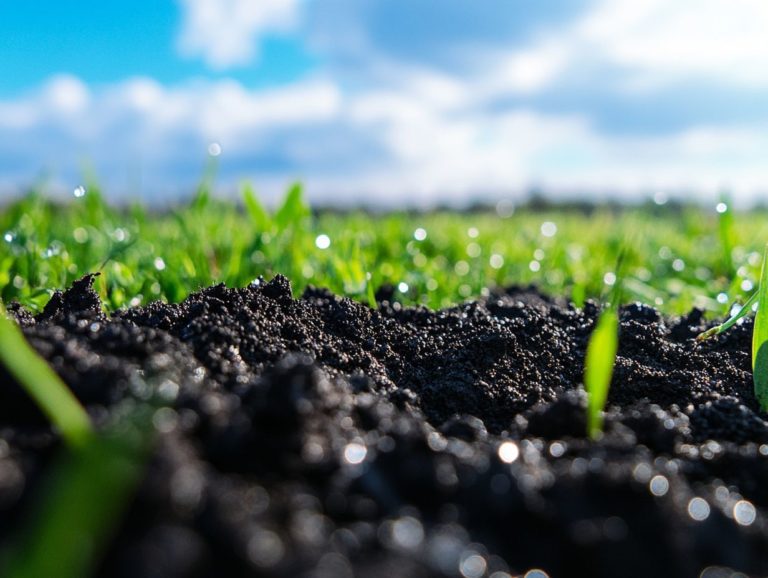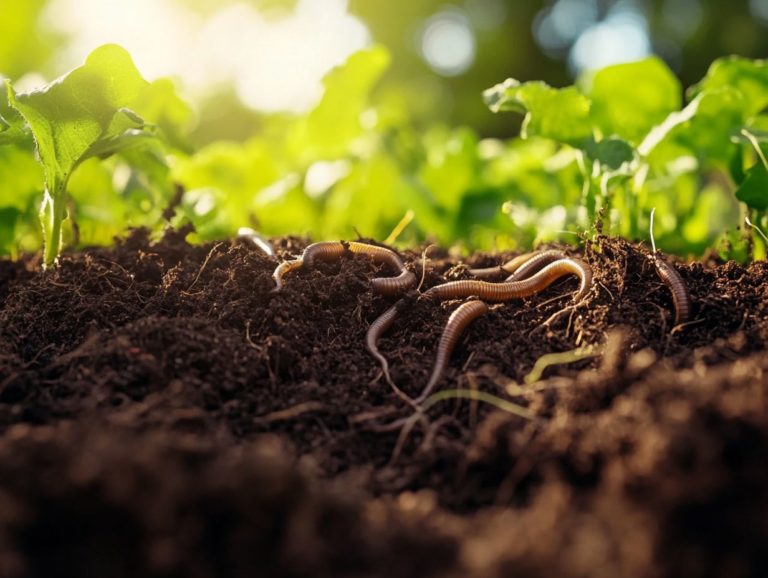The Role of Earthworms in Soil Improvement
Earthworms are often overlooked, yet they play a crucial role in maintaining healthy soil ecosystems. These remarkable creatures inhabit diverse environments worldwide, breaking down organic matter and enhancing nutrient availability. They also aerate the soil, making it healthier.
In this article, you will explore how earthworms contribute to soil improvement. Discover effective methods to boost their populations and learn about the benefits they bring to agriculture, such as increased crop yields and reduced reliance on chemical fertilizers, while enhancing overall soil health and fertility.
Uncover how these unsung heroes of the soil can transform your gardening and farming practices for the better, enriching ecosystems like gardens, forests, and prairies.
Contents
Key Takeaways:
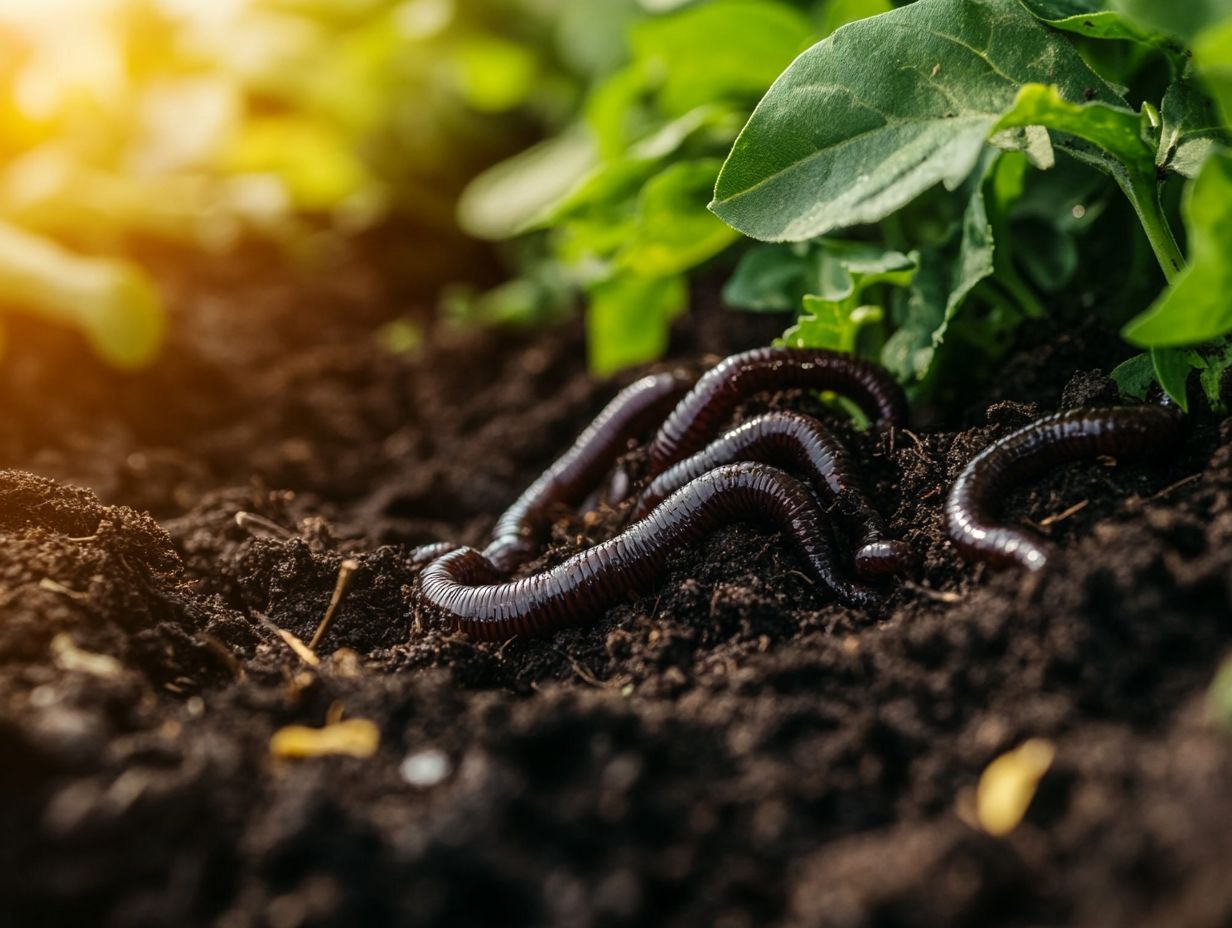
What are Earthworms and Where are They Found?
Earthworms are captivating organisms that play a vital role in various ecosystems, whether in your garden, a nearby forest, or expansive prairies. They significantly contribute to soil health and nutrient cycling. You can find them thriving in places like Arkansas, Booneville, and Tennessee, where organic matter-rich habitats provide the ideal moisture and temperature for their survival.
Belonging to a specific group of worms, earthworms encompass numerous species categorized based on their habitat preferences and physiological features. You might encounter the common earthworm (Lumbricus terrestris) or the red wiggler (Eisenia fetida), each uniquely adapted to specific environments.
These remarkable creatures are essential for improving soil structure, promoting aeration, and facilitating the decomposition of organic matter, which enriches the soil. Their burrowing habits enhance water infiltration, helping to mitigate erosion and support healthy plant growth.
In essence, earthworms contribute not only to the vibrancy of your individual garden but also to the overall biodiversity of their ecosystems. They enhance plant growth and the health of the environments they inhabit.
Earthworms and Soil Improvement
Earthworms serve as vital agents of soil enhancement. They significantly elevate soil health by promoting nutrient cycling and refining soil structure through their inherent behaviors. Their diligent activities facilitate the decomposition of organic matter and nurture a vibrant community of beneficial microbes, amplifying soil fertility.
Their Role in Soil Health
Earthworms are the unsung heroes of healthy soil! They play a pivotal role in nutrient cycling and enhance soil fertility through their burrowing activities. As they consume organic matter, they transform it into nutrient-rich worm castings, which enrich the soil and foster the growth of beneficial microorganisms vital for plant health.
These castings are a treasure trove of essential nutrients like nitrogen, potassium, and phosphorus. They can contain up to five times more beneficial bacteria than the surrounding soil. Research indicates that the activity of earthworms can boost the availability of these nutrients, potentially increasing crop yields by as much as 25%. Their burrowing also aerates the soil, improving water infiltration and root penetration, both crucial for robust plant development.
Soils teeming with earthworm populations can retain moisture up to 40% better. This underscores their significant contribution to soil health and agricultural productivity.
How Earthworms Improve Soil Quality
Earthworms play a crucial role in enhancing soil quality by improving its structure and promoting the decomposition of organic matter. They also increase nutrient availability. Their tunneling activities aerate the soil, enabling water and nutrients to penetrate more effectively.
Their castings provide a rich source of essential nutrients for plants, such as nitrogen, phosphorus, and potassium. This elevates the overall health of your garden or landscape. Start enriching your soil today by welcoming these amazing earthworms into your garden!
Breaking Down Organic Matter

Earthworms are exceptional decomposers, expertly breaking down organic matter like leaves, plant debris, and other organic materials. This process enhances nutrient movement in the soil and improves its structure, contributing to the overall health and fertility of the soil ecosystem.
As these remarkable creatures consume organic matter, they transform it into nutrient-rich castings through complex chemical processes. They engage with various soil organisms, such as bacteria and fungi, which facilitate decomposition.
When earthworms aerate the soil, they create pathways for water and air to reach plant roots efficiently. The castings they produce act as a natural fertilizer, rich in nitrogen, phosphorus, and potassium. This significantly boosts the availability of essential nutrients for plants.
This collaboration among various organisms fosters a balanced soil ecosystem that supports diverse flora.
Enhancing Nutrient Availability
By breaking down organic matter and excreting nutrient-rich castings, earthworms significantly enhance the availability of essential nutrients in your soil. This process is vital for promoting robust plant growth and improving overall soil fertility.
These castings contain a higher concentration of vital elements compared to surrounding soil. They also introduce beneficial microorganisms, playing a pivotal role in sustainable agriculture.
As earthworms tunnel through the soil, they aerate it, improving drainage and allowing roots better access to nutrients. This natural tilling effect enhances water retention and reduces reliance on chemical fertilizers.
Adopting earthworm-enhanced methods will boost your crop yields and promote healthier plants. This creates advantages for both your harvests and the environment while supporting sustainable agriculture.
Aerating and Mixing Soil
Earthworms are your garden’s best friends in enhancing soil aeration and structure. As they burrow through the earth, they create channels that facilitate the circulation of air, water, and nutrients.
This natural mixing process ensures that worm castings are evenly distributed, significantly boosting soil fertility. When these remarkable creatures tunnel through the soil, they break up compacted layers that can hinder root growth and water infiltration.
Research shows that fields teeming with earthworms exhibit improved soil health, including reduced erosion and enhanced moisture retention. Studies on organic farms reveal that crops thriving in earthworm-active soils yield up to 25% more than those in soils with fewer of these beneficial beings.
This advantage extends to plant vitality, as roots can more readily access essential nutrients, resulting in stronger and more resilient growth throughout the growing season.
Methods for Increasing Earthworm Population
You can significantly boost earthworm populations by employing various strategies aimed at cultivating a suitable habitat and refining your soil management practices, including organic compost additions.
By enriching the organic matter content and embracing sustainable agriculture techniques, you will foster flourishing earthworm communities that play a vital role in enhancing soil health and biodiversity.
Start enhancing your soil with earthworms today for a healthier garden tomorrow!
Creating a Suitable Habitat
Creating the perfect habitat for earthworms requires you to ensure adequate moisture, a wealth of organic material, and minimal disturbance to the soil structure. By maintaining these conditions, you can grow a strong number of earthworms that will significantly enhance the health of your soil.
To achieve optimal moisture levels, regularly check the soil s dampness, especially after rainfall or irrigation. Aim to keep the ground consistently moist without letting it become waterlogged.
Incorporating a variety of organic materials think compost, leaves, and grass clippings boosts nutrient availability and supports a robust earthworm population, which is instrumental in enhancing soil health.
Prioritize minimal tillage techniques to maintain the natural soil structure, safeguarding those delicate earthworm burrows.
Using cover crops enhances soil aeration and improves moisture retention.
By proactively managing these elements, you can create a flourishing ecosystem that nurtures earthworms while elevating the overall productivity of your soil and supporting sustainable agricultural practices.
Adding Organic Matter to Soil
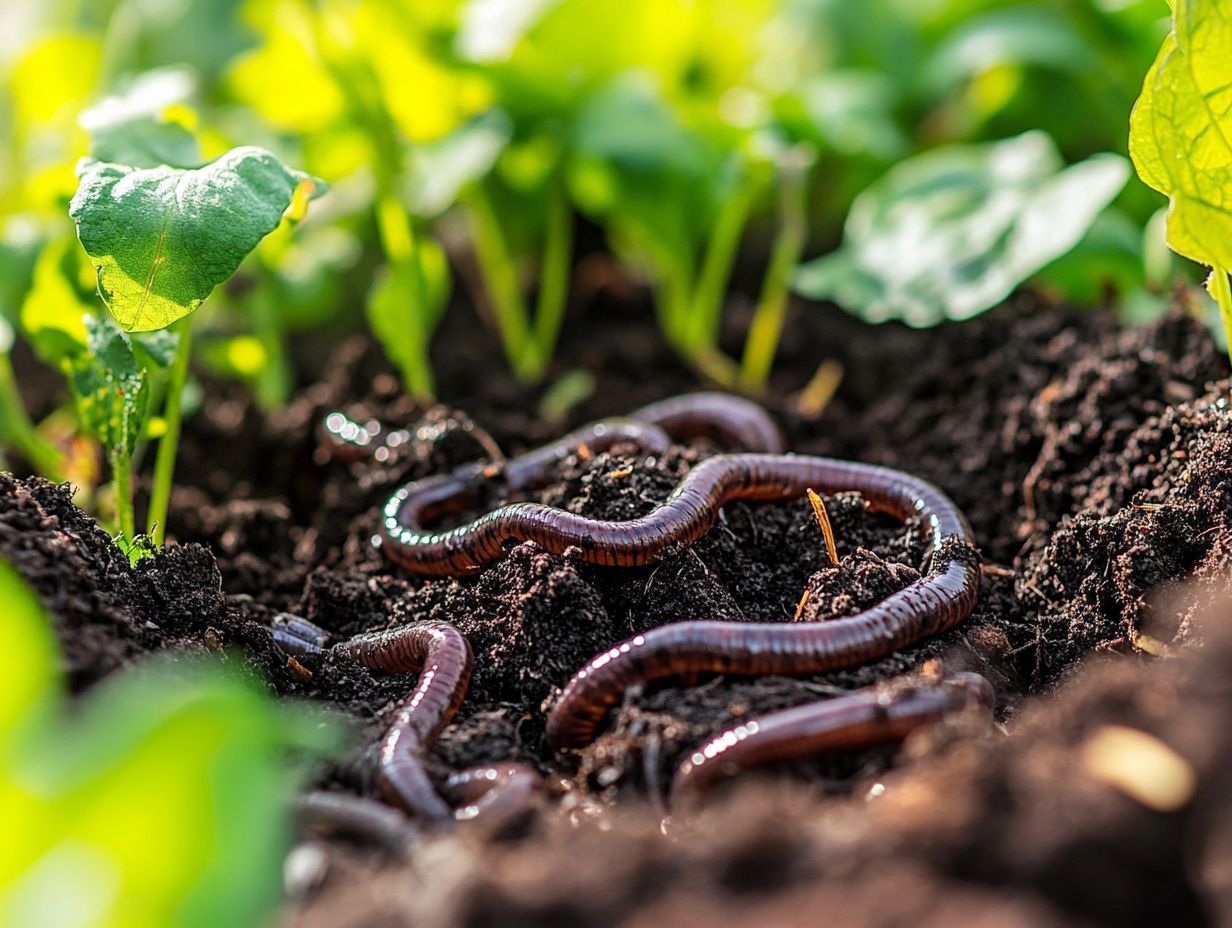
Adding organic matter to your soil is one of the most effective ways to boost earthworm populations, providing them with a food source while enhancing soil quality. By incorporating practices like organic compost and green manures, you can significantly increase the organic matter content, creating an ideal environment for earthworms to flourish.
Beyond compost, consider the importance of mulch. It serves as a protective layer that retains moisture and regulates temperature, benefiting not just earthworms but also supporting tiny living things in the soil that thrive in organic settings.
Using cover crops is another excellent strategy. They help prevent soil erosion and contribute organic material when they break down, further enriching your soil.
These various forms of organic matter nourish earthworm populations and enhance soil structure, facilitate nutrient cycling, and improve water retention. Together, they foster a vibrant ecosystem that supports plant growth and sustainability, allowing your garden to truly thrive.
Benefits of Earthworms for Agriculture
The advantages of earthworms in agriculture are remarkable. They significantly improve soil fertility, boost crop yields, and allow for a reduction in the use of chemical fertilizers.
By nurturing a vibrant soil ecosystem, earthworms play a vital role in promoting sustainable agricultural practices that benefit both the land and those who cultivate it.
Increase in Crop Yields
Earthworms play a crucial role in boosting crop yields by enhancing soil fertility and nutrient availability through their diligent activities underground. Their burrowing improves soil structure and aeration while enriching the soil with vital nutrients essential for thriving plant growth.
Research indicates that fields teeming with earthworms can yield up to 25% more produce than those with fewer worm inhabitants. A study from the University of Illinois highlighted how earthworms significantly enhanced nitrogen levels in corn crops, which in turn reduced the reliance on synthetic fertilizers.
Sustainable farmers have embraced practices such as reduced tillage and cover cropping to encourage earthworm activity, fostering healthier ecosystems. These strategies elevate yields and promote biodiversity, aiding in soil moisture retention and natural pest control.
By integrating earthworms into your agricultural practices, you can pave the way for a more resilient and productive farming future.
Reduction in Chemical Fertilizers
Earthworms can significantly reduce your reliance on chemical fertilizers, steering you toward eco-friendly farming. These amazing creatures enrich soil fertility, creating a healthier ecosystem that reduces your dependence on synthetic fertilizers.
They play a vital role in nutrient movement. By breaking down organic matter, they convert it into forms that plants can easily absorb.
Their burrowing activities aerate the soil, improving its structure and promoting water retention. Both are essential for strong plant growth.
You can attract these beneficial earthworms by adopting practices like minimal tillage and adding organic matter to your soil. By creating a diverse habitat, you can enhance soil health and build a more resilient ecosystem, boosting productivity without harmful chemicals.
Frequently Asked Questions
What is the role of earthworms in soil improvement?
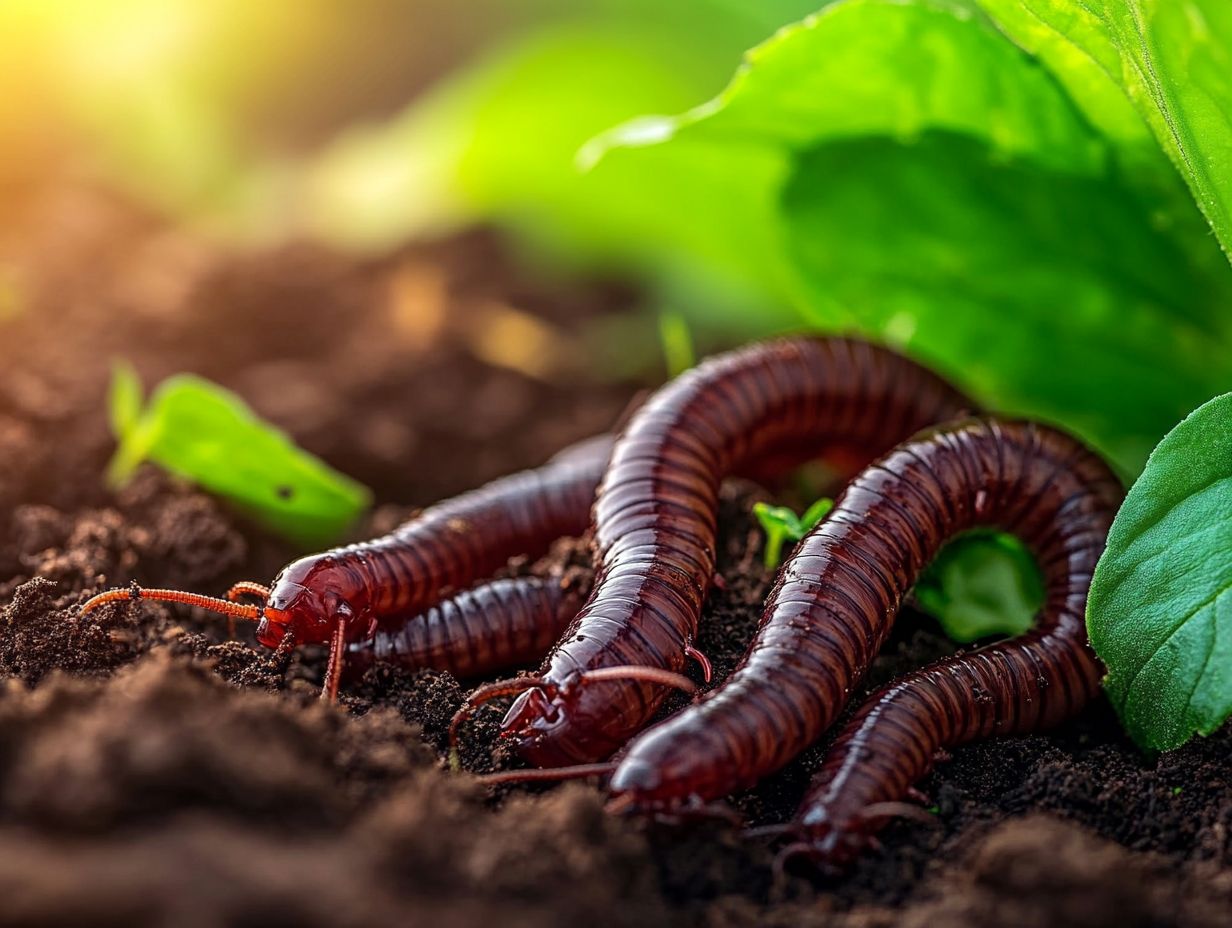
Earthworms are amazing creatures that transform your soil! They aerate the soil, increase nutrient availability, and enhance soil structure.
How do earthworms aerate the soil?
As earthworms burrow, they create tunnels that allow air and water to penetrate deeper. This improves overall soil aeration.
How do earthworms increase nutrient availability?
Earthworms consume organic matter and digest it, releasing nutrients in forms that plants can absorb. They also excrete nutrient-rich castings, which further enrich the soil.
What do earthworms contribute to soil structure?
They create a crumbly, porous soil structure by mixing organic matter with mineral particles. This helps with water retention and root growth.
Can earthworms be beneficial for all types of soil?
Yes, they can improve the health of sandy, clay, and loamy soils. However, some species may prefer specific types of soil.
Are there any downsides to having earthworms in soil?
While they generally benefit soil health, too many earthworms can damage plant roots. It’s important to maintain a balanced population.
Start using earthworms in your farming today and see the difference!

